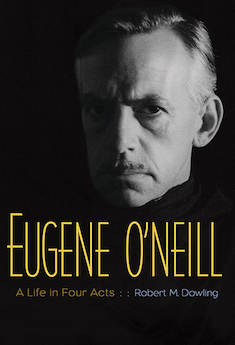By Caitlin Mattera
From the first words of Eugene O’Neill: A Life in Four Acts, Robert M. Dowling demonstrates his sharp, scholarly focus and deep admiration for his subject. In the introduction, he outlines his own role as biographer, summarizing his early encounter with and lifelong interest in Eugene O’Neill’s work. He suggests several similarities, such as their Catholic upbringings, religious skepticism, and strong Irish heritages, which unite him with his subject. Perhaps most helpfully, he positions his own work within the canon of O’Neill scholarship. Despite his extensive research and the care with which he investigates even minute details and unconfirmed stories, Dowling never claims to have written a definitive biography that answers all the questions the playwright’s unconventional life and work have raised. Instead, Dowling aims to engage and convert readers who may be unfamiliar with O’Neill’s work and the relevant history of American theatre by constructing an accessible, interesting, and cohesive narrative.
Dowling commences his project with a prologue, “The Irish Luck Kid, 1916,” which establishes the playwright’s humble beginnings and the stakes for his eventual success. According to Dowling, O’Neill will go on to create an innovative form of American theatre characterized by a blunt, honest voice, deeply flawed characters, naturalistic settings, and a novelist’s attention to story arc and the staging of individual scenes. By prefacing his discussion of individual works, struggles, and failure with this premonition of the playwright’s eventual contribution to the American stage, Dowling foreshadows O’Neill’s award-winning and critically-acclaimed canon and manages expectations for even the uninitiated reader.
The biographer’s evocation of a young Eugene O’Neill, in his own words a “tragic optimist” who learned from his Irish family to value the struggles of life over their outcomes, establishes a strong character the reader can root for. Dowling also argues that O’Neill’s history and understanding of self influence the many biographical and autobiographical characters in his plays. In fact, Dowling spends the first act of his biography, “The Ghosts at the Stage Door,” tracing O’Neill’s childhood and history as they explain his diverse cast of characters and innovative settings. At times, this first act can be overwhelming for a reader less familiar with O’Neill’s life and work, as Dowling summarizes plays in the space of paragraphs and conjectures about the presence of minor acquaintances in O’Neill’s creative consciousness.
However, as subsequent acts unfold, Dowling puts his enviable knowledge and narrative focus to work, seamlessly weaving together biographical details and relevant historical documents and context. He effortlessly guides the reader through O’Neill’s fascinating life, imbuing the story with a strong appreciation of the playwright’s work. Dowling pays particular attention to O’Neill’s unpublished and lesser-known works, including his forays into fiction and suspicion that he should have been a novelist. He explains O’Neill without exonerating him, depicting several less than flattering incidents to present a nuanced understanding of the playwright’s life.
In the end, Dowling’s extensive effort pays off: he fashions his exhaustive knowledge of O’Neill’s life into a single, lucid narrative that skillfully synthesizes O’Neill’s personal failures, unconventional perspective, and creative success. His tangible enthusiasm, too, garners converts.
Yesterday, I turned a corner in the library stacks and found myself face to face with Nine Plays by Eugene O’Neill. With no prior experience but the curiosity fostered by Dowling’s complex, captivating narrative, I picked up the book.
Caitlin Mattera (ΦBK, Drew University, 2013) graduated summa cum laude from Drew with bachelor’s degrees in English and Classics, and a minor in Writing. She is currently pursuing graduate study at Drew University in preparation to become a secondary school English teacher.




